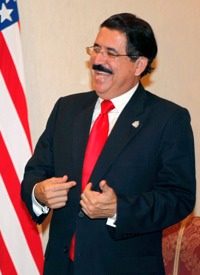
"The Cold War has ended today here in San Pedro Sula,” proclaimed Honduran president Manuel Zelaya, referencing the 1962 decision to ban Cuba as it pursued an alliance with the Soviet Union during the Cold War. “We have made a wise and honorable decision."
President Barack Obama and Secretary of State Hillary Clinton both supported the move, but with conditions. Cuba must move toward “democracy,” respect human rights, and make progress on freeing political prisoners. U.S. officials tried to portray the decision as a victory, with Clinton saying she was pleased everybody agreed that Cuba could not simply take its seat if it chose to pursue readmission.
"The ball is now in Cuba’s court to abide by the principles of human rights and democracy embodied in the Inter-American Democratic Charter," explained the chair of the Foreign Affairs subcommittee on the Western Hemisphere, U.S. Rep. Eliot Engel. Other representatives, including South-Florida Republican Ileana Ros-Lehtinen, who represents a large Cuban constituency, blasted the decision, calling it "an affront to the Cuban people and to all who struggle for freedom, democracy and fundamental human rights."
"Rather than upholding democratic principles and fundamental freedoms, OAS member states, led by the OAS secretary general, could not move quickly enough to appease their tyrannical idols in Cuba," charged Rep. Ros-Lehtinen. U.S. Representatives Mario and Lincoln-Diaz Balart, also Republicans from Miami, issued a joint statement, saying they felt betrayed and calling the OAS a “putrid embarrassment.” Cuban-American Senator Bob Menendez of New Jersey even threatened to stop U.S. funding of OAS, which receives more than half of its budget from the United States.
Despite the lack of an immediate response from the Cuban government, it was clear even before the announcement that the communist island’s officials had little desire re-join the organization. Randy Alonso, an anchorman for the state-run evening news program, snubbed the olive branch, saying: "Cuba has not asked for nor does it wish to return to the OAS, which is steeped in a submissive and shady history."
Leftists throughout Latin America were happy with the decision, according to a Reuters article entitled "OAS ends Cuba suspension after 47 years." But for Cuba to re-join the transnational body, it will have to take initiative and request it. The new approach to Cuba is becoming readily apparent, with Washington having lifted certain restrictions on travel and remittances to the communist island. But Cuba isn’t interested.
Former Cuban president Fidel Castro said in April that he did not want to “hear the vile name of that institution” and called it a tool of the United States. In a more moderate tone, Ricardo Alarcon, the president of Cuba’s national assembly, called the decision a victory for Latin America and the Cuban people. But, he noted that it does not alter Cuba’s stance.
“In the past two months, Havana has thrown one epithet after another at the OAS,” wrote Marifeli Perez-Stable, the vice-president for democratic governance at the Inter-American Dialogue in Washington, D.C. “I don’t think Raúl Castro will take up the challenge contained in the new resolution.” Confirming the dictatorship’s position, Cuban foreign minister Bruno Rodriguez Parrilla told the state-run newspaper that there was no discussion regarding Cuba’s reentry and that it preferred to pursue Latin American and Caribbean integration without a presence from “outside the continent.”
Rather than accommodating and pandering to left-wing dictatorships and multi-national bodies, the United States should cut ties and funding to the OAS and other internationalist bodies. Regional “integration” hardly serves the interests of the American people and represents a serious danger to the U.S. Constitution and American sovereignty. Trade and discussions do not require such an organization — and American taxpayers should not be forced to pay for it.
Photo: AP Images


